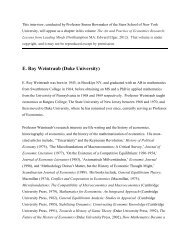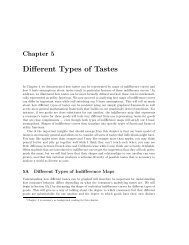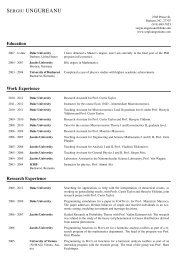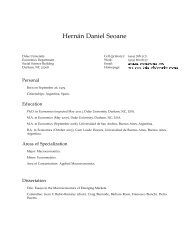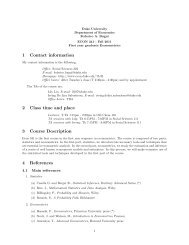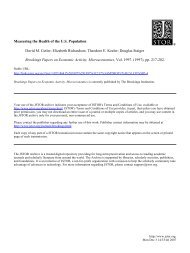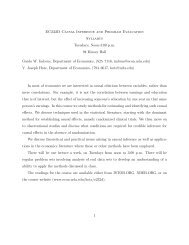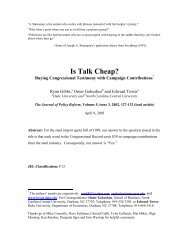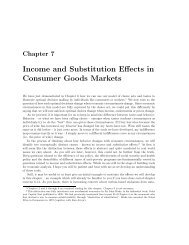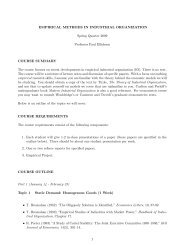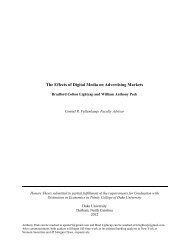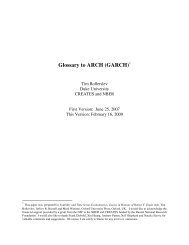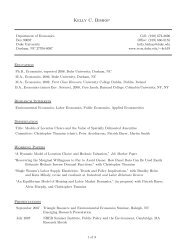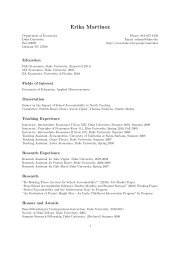Bolívar Distorted: The Effects of Exchange Controls on the ...
Bolívar Distorted: The Effects of Exchange Controls on the ...
Bolívar Distorted: The Effects of Exchange Controls on the ...
Create successful ePaper yourself
Turn your PDF publications into a flip-book with our unique Google optimized e-Paper software.
In July 2003, just as a large proporti<strong>on</strong> <str<strong>on</strong>g>of</str<strong>on</strong>g> its foreign debt was about to come due, <strong>the</strong><br />
Central Bank <str<strong>on</strong>g>of</str<strong>on</strong>g> Venezuela (BCV) emitted a b<strong>on</strong>d denominated in Bolivars valued at $1.5 billi<strong>on</strong><br />
($U.S.). <str<strong>on</strong>g>The</str<strong>on</strong>g> b<strong>on</strong>d was available for sale in Bolivars or Dollars, but could <strong>on</strong>ly be remitted in<br />
Bolivars. This effectively closed <strong>the</strong> market to foreigners, and Venezuelans, with few o<strong>the</strong>r<br />
investing opti<strong>on</strong>s, chose to buy <strong>the</strong> b<strong>on</strong>ds. This acti<strong>on</strong>, combined with <strong>the</strong> exchange c<strong>on</strong>trols,<br />
helps maintain <strong>the</strong> local demand for Bolivars at a time when many investors are attempting to<br />
unload <strong>the</strong> Venezuelan currency.<br />
A uniform import and export tariff might be a more efficient manner <str<strong>on</strong>g>of</str<strong>on</strong>g> gaining revenue<br />
for <strong>the</strong> government. As most c<strong>on</strong>sumer goods come from abroad, raising <strong>the</strong> Value-Added Tax<br />
could be a more appropriate method for financing <strong>the</strong> government’s new projects. A tax like this,<br />
however, would be imposed <strong>on</strong> <strong>the</strong> poor as well as <strong>the</strong> rich. As Chávez claims to be a pi<strong>on</strong>eer for<br />
<strong>the</strong> poor, this would never do. High oil prices are bringing in more revenue right now, but <strong>the</strong>re<br />
is no guarantee that <strong>the</strong>y will stay high, and we have seen historically that gas price hikes in<br />
Venezuela have had disastrous c<strong>on</strong>sequences.<br />
A more cynical group <str<strong>on</strong>g>of</str<strong>on</strong>g> ec<strong>on</strong>omists views investor c<strong>on</strong>fidence in New York as a ploy to<br />
hedge any criticism <str<strong>on</strong>g>of</str<strong>on</strong>g> <strong>the</strong> government from abroad while keeping Venezuelans poor. CADIVI<br />
figures show that. Miguel Octavio notes that Venezuelan investors in Venezuela receive <strong>the</strong>ir<br />
dividends in a worthless currency ever being eroded by inflati<strong>on</strong>; meanwhile foreign investors<br />
abroad receive <strong>the</strong>ir dividends in dollars at <strong>the</strong> <str<strong>on</strong>g>of</str<strong>on</strong>g>ficial rate. Kaempfner, Tower and Willet note<br />
that “governments may spend a lot <str<strong>on</strong>g>of</str<strong>on</strong>g> m<strong>on</strong>ey trying to save <strong>on</strong>e identifiable individual,” 98 i.e.<br />
investors abroad whose m<strong>on</strong>etary support is critical to staying in <strong>the</strong> good favor <str<strong>on</strong>g>of</str<strong>on</strong>g> <strong>the</strong> IMF and<br />
<strong>the</strong> SEC.<br />
C<strong>on</strong>clusi<strong>on</strong><br />
98 Kaempfner, et.al. “Trade Protecti<strong>on</strong>ism.” June 2001.<br />
40



